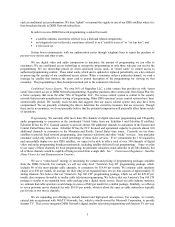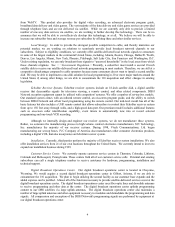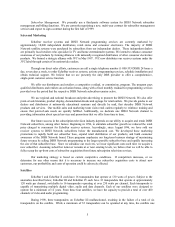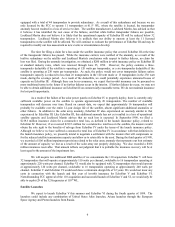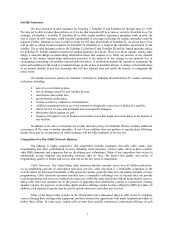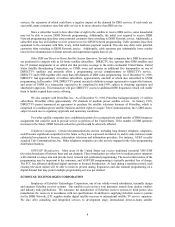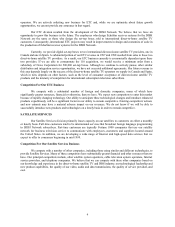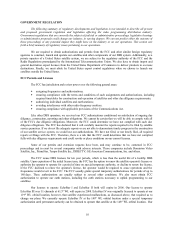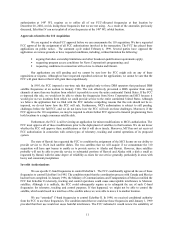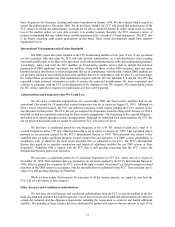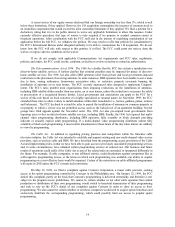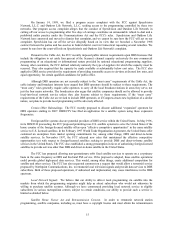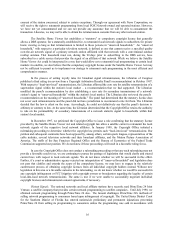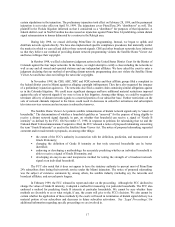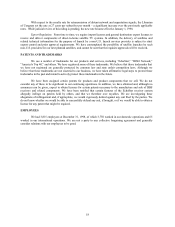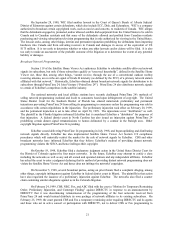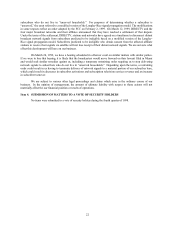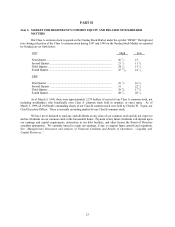Dish Network 1998 Annual Report Download - page 15
Download and view the complete annual report
Please find page 15 of the 1998 Dish Network annual report below. You can navigate through the pages in the report by either clicking on the pages listed below, or by using the keyword search tool below to find specific information within the annual report.13
successfully construct and launch Ku-band, extended Ku-band, Ka-band and/or low earth orbit satellites, we might be
able to use those satellites to complement the DISH Network, or for a variety of other uses. It is possible that the Ku-
band and Ka-band orbital locations requested by us and others could permit construction of satellites with sufficient
power to allow reception of satellite signals by relatively small dishes. As these projects are in the early stages of
development and are currently being challenged by several companies with interests adverse to ours, there can be no
assurance that the FCC will sustain these licenses, or grant the pending applications, or that we will be able to
successfully capitalize on any resulting business opportunities.
Regulations
DBS Rules. Once the FCC grants a conditional construction permit, the permittee must proceed with due
diligence in constructing the system. The FCC has adopted specific milestones that must be met in order to retain the
permit, unless the FCC determines that an extension or waiver is appropriate. Permittees must file semi-annual
reports on the status of their due diligence efforts. The due diligence milestones require holders of conditional permits
to complete contracting for construction of their systems within one year of grant of the permit. Additionally, the
satellites must be operational within six years of grant. For permits issued after January 19, 1996, permittees must
complete construction of the first satellite in their system within four years of grant of the permit. The FCC also may
impose other conditions on the grant of the permit. The holders of new DBS authorizations issued on or after
January 19, 1996 must also provide DBS service to Alaska and Hawaii. We are presently not able to satisfy this
requirement with EchoStar IV. Accordingly, we have requested a waiver of that requirement. The state of Hawaii has
requested many conditions to such a waiver, and we have opposed several of these conditions. Those holding DBS
permits as of January 1996 must provide DBS service to Hawaii or Alaska from at least one of their DBS satellites or
they will have to relinquish their western assignments.
Subject to applicable regulations governing non-DBS operations, a licensee may make unrestricted use of its
assigned frequencies for non-DBS purposes during the first five years of the ten-year license term. After the first five
years, the licensee may continue to provide non-DBS service as long as at it dedicates at least one-half of its total
capacity at a given orbital location to providing DBS service. Further, the FCC indicated its desire to streamline and
revise its rules governing DBS satellites. We cannot be sure about the content and effect any new DBS rules might
have on our business.
Certain Other Communications Act Provisions. As a distributor of television programming, we are also
affected by numerous laws and regulations, including the Communications Act.
We believe that we remain free to set prices and serve customers according to our business judgment,
without rate regulation or the statutory obligation under Title II of the Communications Act to avoid undue
discrimination among customers. Even if, under a future interpretation of the 1996 Act, we were classified as a
telecommunications carrier subject to Title II, we believe that such reclassification would not likely increase
substantially the regulatory burdens imposed on us or have an adverse impact on our DBS operations, although we
can not be certain.
We believe that, because we are engaged in a subscription television programming service, we are not
subject to many of the regulatory obligations imposed upon broadcast licensees. However, the FCC could determine
in the future that we should be treated as a broadcast licensee. In fact, certain parties have requested such treatment. If
the FCC determined that we are a broadcast licensee, we could be required to comply with all regulatory obligations
imposed upon broadcast licensees.
The Communications Act, and the FCC’s implementing regulations, provide that when subsidiaries of a
holding company hold certain types of FCC licenses, foreign nationals or their representatives may not own in excess
of 25% of the total votes or equity of record of the holding company, considered on a fully-diluted basis, except after
an FCC public interest determination. Although the FCC’s International Bureau has ruled that these limitations do not
apply to providers of DBS services, certain parties have challenged that ruling. The FCC has not acted on that
challenge. These foreign ownership limitations would apply to our fixed satellite service authorizations if we call
ourselves a common carrier, or if the FCC decides to treat us as such a carrier. The FCC has noted that we propose to
operate one of our proposed satellite systems on both a common and non-common carrier basis.


